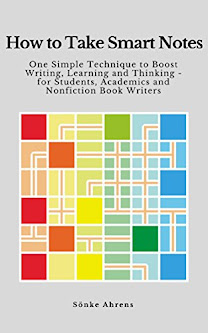The key to good and efficient writing lies in the intelligent organisation of ideas and notes. This book helps students, academics and nonfiction writers to get more done, write intelligent texts and learn for the long run. It teaches you how to take smart notes and ensure they bring you and your projects forward.
The Take Smart Notes principle is based on established psychological insight and draws from a tried and tested note-taking-technique. This is the first comprehensive guide and description of this system in English, and not only does it explain how it works, but also why. It suits students and academics in the social sciences and humanities, nonfiction writers and others who are in the business of reading, thinking and writing.
Instead of wasting your time searching for notes, quotes or references, you can focus on what really counts: thinking, understanding and developing new ideas in writing. It does not matter if you prefer taking notes with pen and paper or on a computer, be it Windows, Mac or Linux. And you can start right away.
Thoughts:
Sönke Ahrens, a professor in systematic education at Hamburg University, has based this book on the remarkable note-taking system of the revered sociology professor Niklas Luhmann.
Luhmann wrote and organized over 90,000 index cards to support his 30-year-project ‘A Theory of Society’. His unique note-taking system, based on the Zettelkasten or slip-box method, helped him to write around 60 books and hundreds of articles on a wide range of subjects.
The book is not fully focused on note-taking. It also discusses many psychological concepts, such as the mere-exposure effect, Miller's law, survivorship bias, Parkinson's law, the tunnel effect, etc.
While Ahrens has described the Zettelkasten method and why you should adopt it, the how in ‘How to Take Smart Notes’ is rather vague. Also, he has stopped using the software mentioned in the book and has switched to another.
I liked the book in that it introduced me to Zettelkasten. I love the idea because it appeals to my systematic, organized side. However, the lack of illustrative examples makes the writing stiff and the book difficult to finish.
I read the first few chapters and liked and understood the method. I was disappointed that there were no examples to illustrate its actual implementation.

